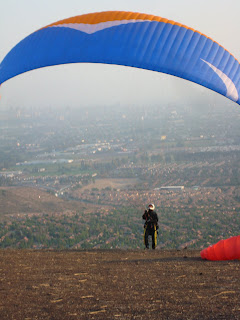Location: The Skies of Santiago, Chile
Rundown: In full-tilt paragliding season. The thermals are strong and the flyin' is easy...most of the time. Thermallin', not just for diabetics anymore!
Here's a little video to start it off!
Piloting! Sweet!
In the last couple of month I've been getting out to fly about twice a week. Drive up into the Huecheraba canyon to the prime flying site in Santiago on dusty, winding switchbacks, past shrub trees and big-eyed cows.
The gear is light and small enough to fit in a backpack and is ready to fly in less than five minutes. We fly with radios and reserve chutes, just in case.
It gets cold in the air, since you're always have air flowing around you, so even on the warm days, we fly with jackets.
Pilots lay their canopy out with the wind flowing over their backs, and check their rigs before 'inflating' the paraglider. The canopies are just chambers of air that keep the wing's shape, so there needs to be a little air moving to launch. Like landlocked surfers, pilots wait on ridges for the conditions to be right to launch.
Pull the canopy into the wind and the cells fill with air. Turn under the canopy and do the odd, loping gait into the wind to launch.
And away you go.
Dynamic flying is a little like surfing. The wind comes in over the flatlands and is deflected up the mountain side. We take advantage of the lift, ride it up above where we launched. Generally, flights are about an hour or so, depending, but I've had flights as long as two hours. You just need to know where to look for the lift.


Flying is pretty gentle when the conditions are good. When they aren't it's like being on a rocking boat. You're a pendulum always trying to find equilibrium. Eat your heart out physics.
The rear of each wing is attached to a break that is used for steering. Pull on the left break, the left wingtip catches more wind and slow, the right wing is moving faster and turns the glider left. Simple.


Huecheraba is a popular place to fly, just off Vespucio Norte. On good days a dozen or so brightly colored canopies will be floating the sky. Like good pilots, we keep our heads on a swivel to avoid collisions, and thought there is a lot of space up there, sometimes you get pretty close to each other!


There's a saying around the paragliding community: 'There are no good pilots, only old pilots". There are indeed a few old pilots who have been flying for twenty years in Santiago, and many younger good pilots as well to take notes and fly with.
My instructors have been amazing. Juan Sikic and Marcelo Pairoa are very experienced, teaching in Chile and Spain. If you're ever in Santiago, go out for a day flying tandem with them! http://www.parapente.cl/ Contact them at: parapente@parapente.cl
Marcelo comes blasting in out of the sun. When great instructors aren't teaching, they're flying!
A few weeks ago the sun was setting in the West as the moon was rising in the East. The paragliders were still up. Breathtaking!
We often fly until dark, coming down just in time for the end of the twilight!
The evenings are the best time to fly because the land is still hot from the sun, but the air is cooler, so good thermals arise. Flying at sunset is pretty tough, but someone has to do it. So, what did you do Sunday night?













